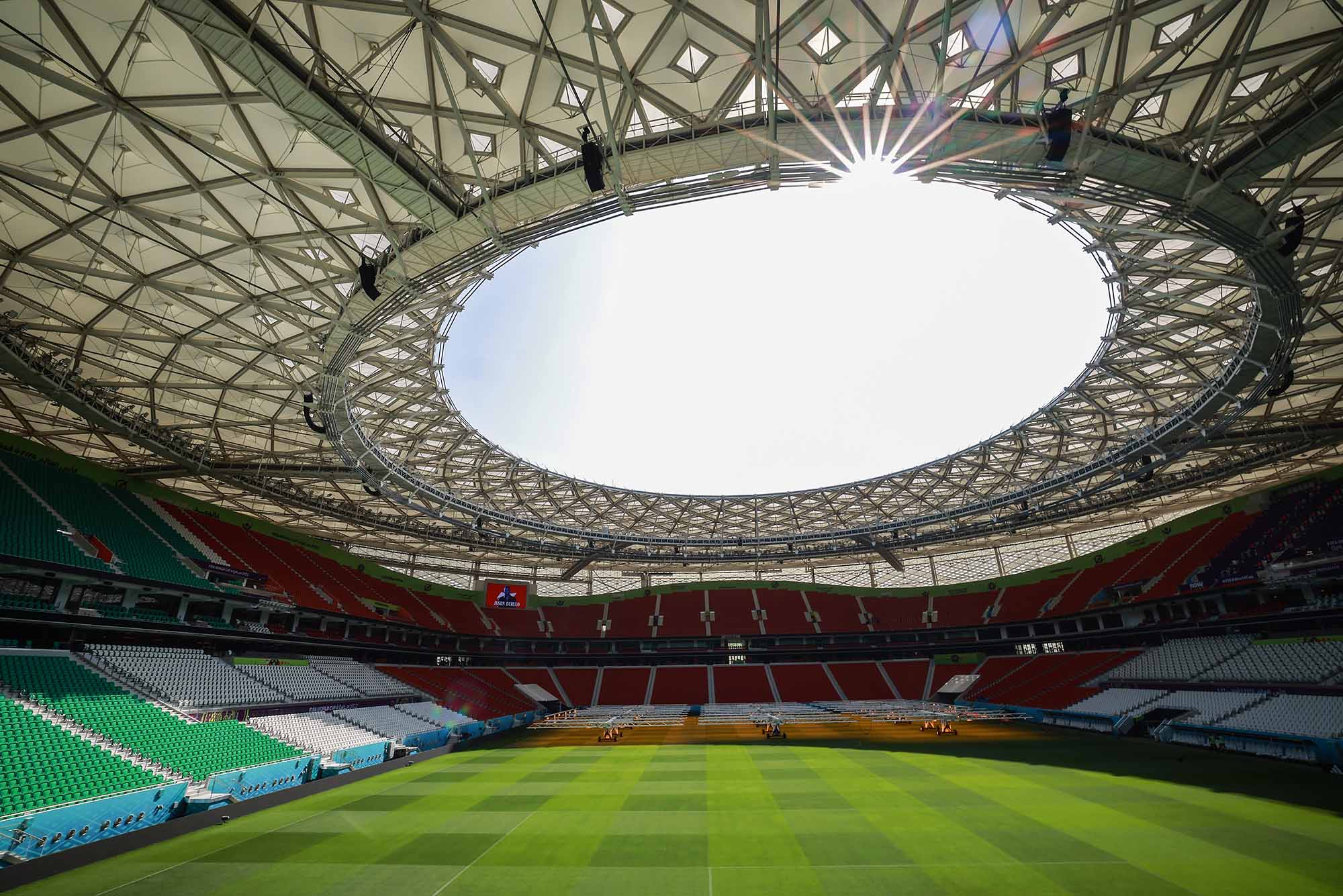Should You Watch the 2022 FIFA World Cup despite Host Qatar’s “Serious Human Rights Problems”?

FIFA World Cup organizers want fans to concentrate on the sporting action during soccer’s marquee event—but many feel host nation Qatar’s human rights record has tainted the competition. Photo of Al Thumama stadium in Doha, Qatar, by Hector Vivas/FIFA/Getty Images
Should You Watch the 2022 FIFA World Cup despite Host Qatar’s “Serious Human Rights Problems”?
A BU international relations expert on countries using sports to cleanse their image and whether fans can look past the controversy of Qatar’s migrant worker abuse to enjoy the matches
For football fans—the soccer kind—the World Cup means everything. The planet’s biggest sporting event has always been about more than a game. Entire countries shut down to watch their favorite teams compete—players becoming national heroes or villains with one timely goal or missed penalty kick. It’s nerve-jangling, joyous, unifying, magical.
But this year, the spectacle has been tainted for many fans. The 2022 World Cup, which kicks off November 20 and lasts until December 18, is being held in Qatar, a small oil- and gas-rich country in the Middle East with a dubious soccer record—and an even worse human rights one.
Instead of dreaming excitedly about the matches—who will win, who will be top scorer—supporters and the media are talking about the abuse of migrant workers, widespread human rights violations, and threats to LGBTQIA+ supporters.
Amnesty International has called this year’s event the “Qatar World Cup of Shame,” highlighting the mistreatment of the migrant workers and forced labor—largely from Bangladesh, India, and Nepal—building the tournament’s stadiums and infrastructure. Human Rights Watch has called out the country’s “serious human rights problems,” warning fans that security forces routinely arrest LGBTQIA+ people and “are detaining and abusing LGBT people simply for who they are.” Freedom House gives Qatar a “not free” thumbs down in its assessment of global political and civil liberties.
But soccer’s governing body, FIFA, which is promising a “World Cup like no other,” would rather ignore that discussion. Perhaps not surprising given that it raises billions of dollars from the World Cup and expects five billion viewers to tune in and watch. In a recent statement, FIFA boss Gianni Infantino pleaded with teams competing in the competition to “focus on the football!” Despite acknowledging that sport doesn’t happen in a vacuum, he asked that national associations “do not allow football to be dragged into every ideological or political battle that exists.”
Many seem set on ignoring his pleas: eight European team captains could wear rainbow armbands during games; Denmark has produced an all-black protest jersey.
Qatar, which hopes the tournament boosts its international standing and helps diversify its economy, has responded to the furor by suggesting some of the criticism may be racially motivated. It also highlighted changes to its labor laws and said that while it won’t be changing laws that criminalize same-sex sexual activity, it would welcome LGBTQIA+ people.
So, where does all that leave everyday fans? Should they watch a tournament they love and celebrate the first-ever World Cup in the Middle East? Or does cheering on their team make them complicit in an act of “sportswashing,” helping a regime use soccer to launder its global reputation?
The Brink spoke with Henrik Selin, Boston University Frederick S. Pardee School of Global Studies associate dean for studies and an associate professor of international relations. A research expert on sustainable development and global governance and institutions, he’s also a big soccer fan.
Q&A
with Henrik Selin
The Brink: Will you be watching the World Cup?
Selin: Yes, I will. It’s a little bit strange to be watching it in November and December, as opposed to the middle of the summer. It is a slightly odd tournament for a number of reasons.
The Brink: I always watch the World Cup, but given all the controversy, I feel differently about it this year. How about you?
Selin: Yes, I definitely feel different about it. There is lots of evidence to suggest that Qatar winning the bid was riddled with financial irregularities. It has been tainted right from the time that it was awarded to the host nation.
The Brink: Qatar’s aim with this World Cup is to burnish its image and it’s spent a reported $220 billion to make it happen. But instead, we’re talking about human rights abuses, worker exploitation, and gay rights. Do you think it’ll regret its bid?
Selin: My guess is probably not. This is as much about hosting the games as the legacy. In 4 years from now, 8 years from now, 12 years from now, people will know that Qatar was hosting the World Cup in football, but some of the surrounding conflicts leading up to the games might very well be forgotten, or at least not remembered as well.
The Brink: The head of Qatar’s World Cup committee has said the state is “using this tournament as a vehicle for change.” Can sporting events like the World Cup actually bring real, meaningful change to a country or its relations with other countries?
Selin: I think that is somewhat doubtful. If we are looking at other, less democratic countries that have hosted the World Cup, or the Summer Olympics or the Winter Olympics, I don’t think that we see a lot of change before and after the games. There might be more cosmetic changes leading up to the games, but once the games are over, the floodlights are shut down, and everyone leaves, then it’s very likely that it will return to normal.
The Brink: In 2011, the Emir of Qatar bought French soccer team Paris Saint-Germain—now home to stars like Messi, Neymar, and Mbappé. In England, two Premier League teams are owned by Middle East–based leaders and entities with controversial human rights records. It’s all led to a focus on whether soccer is being used as a vehicle for cleaning international reputations, or sportswashing. What’s the attraction of soccer—and sports in general—as a PR and international relations tool?
Selin: It is one of relatively few sports that have a worldwide audience. Major European clubs are now broadcast all over the world. You can watch the games in Canada, Australia, Chile, South Africa, Japan, or wherever. So, owning a major European football team is definitely a way of getting out there and trying to create a positive spin. To address this in international relations terms, it’s wielding soft power, it’s about building a brand.
But also, for some of the regimes hosting the World Cup, you are also doing it partly for domestic consumption. In recent times, Russia has hosted both the World Cup and the Winter Olympics, and I think that was one way for Vladimir Putin to cement his reputation in Russia as a strong and successful leader, at the same time as there was an international aspect to it in terms of being seen as important on the world stage.
The Brink: One of the most famous examples of using sports for political ends, the 1936 Berlin Olympics, helped legitimize the Nazi regime, but the games were also hugely controversial—and now mostly remembered for Jesse Owens’ famous victories. So, does it work, is there a downside for regimes?
There seems to be relatively little downside, besides having to spend lots and lots of money. But if you are not a democratically elected leader, and you’re not really held accountable, and you have the hundreds of millions of dollars to spend, then you can do it. Hosting these games—whether we’re talking about the Olympics or the World Cup—requires a lot of money. And that’s why, also, moving forward, we are starting to see more countries coming together in joint bids—the next World Cup will be in Canada, the United States, and Mexico.
The Brink: How should fans like us feel? I want to enjoy the games, but I don’t want to help legitimize a regime like this one.
It’s a good question, and in some ways it comes down to individual responsibility. Neither you nor I had anything to do with the process where the World Cup ended up; it’s not that we could have acted differently, and it would have gone somewhere else. I’m not sure what you and I, as football fans, would actually gain from boycotting by not watching the games. If you and I don’t watch the games, I don’t think that’s going to help the people in Qatar.
The Brink: This all got personal for you recently. Your favorite team, the Premier League’s Newcastle United, was bought by a consortium led by Saudi Arabia’s Public Investment Fund. They’re now one of the richest sports teams in the world—but also one of the most controversial. As a fan, what does that feel like?
I studied in Newcastle [in North East England] in ’93, ’94. They were some golden years for the team—they came really close to winning the Premier League—but it’s been 25 years of hurt since. So, there’s part of me that is very happy. It’s been fantastic to watch the team over the last year and it seems like they’re really building a team for the future. On the other hand, I know where the money has come from, so I’m definitely conflicted—and conflicted about where money has taken the sport overall.
The Brink: How do these soft power tactics and issues factor into how Pardee teaches international relations?
I teach an undergrad level course on global governance and international organization. Given that there is no world government and there are relatively few enforcement mechanisms, perceptions are important in international politics. If you are perceived as a reliable partner, that is important. And if you’re perceived as an unreliable partner, then that’s a real negative image to have attached to a country. So, building these areas of soft power—which could be sports, movies, the arts—if that brandishes your reputation as an important country, as a reliable partner, that can be very important in international relations.
The Brink: One last question—this time about the soccer itself. Who do you think is going to win the World Cup?
Traditionally, it’s been that when the World Cup is in Europe, a European team wins, and when it’s in the Americas, a team from the Americas wins. There’s only been two times when it hasn’t been held in Europe or the Americas. I still think that a European team will win—the question is, which European team? Never underestimate the Germans, but if I’m going for an upset, since it’s in a very small country, maybe a small country will win, and maybe that’s Belgium. They have a really good squad.

Comments & Discussion
Boston University moderates comments to facilitate an informed, substantive, civil conversation. Abusive, profane, self-promotional, misleading, incoherent or off-topic comments will be rejected. Moderators are staffed during regular business hours (EST) and can only accept comments written in English. Statistics or facts must include a citation or a link to the citation.